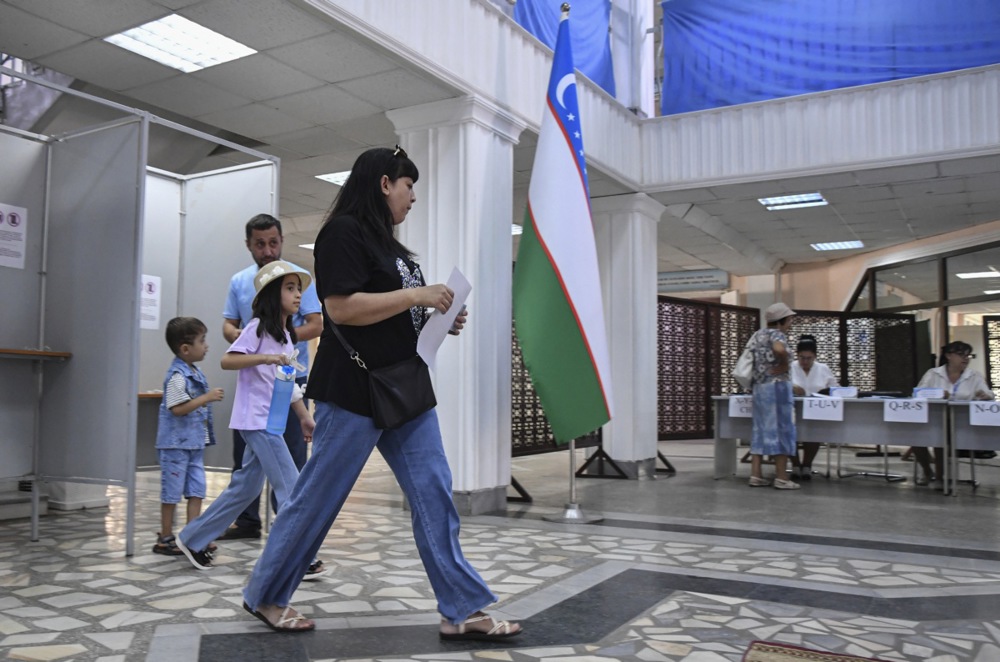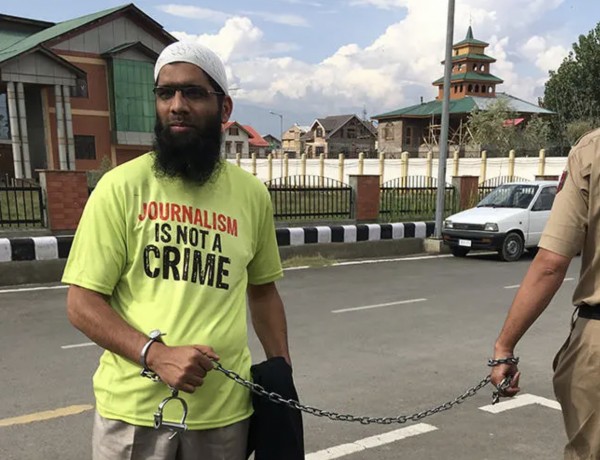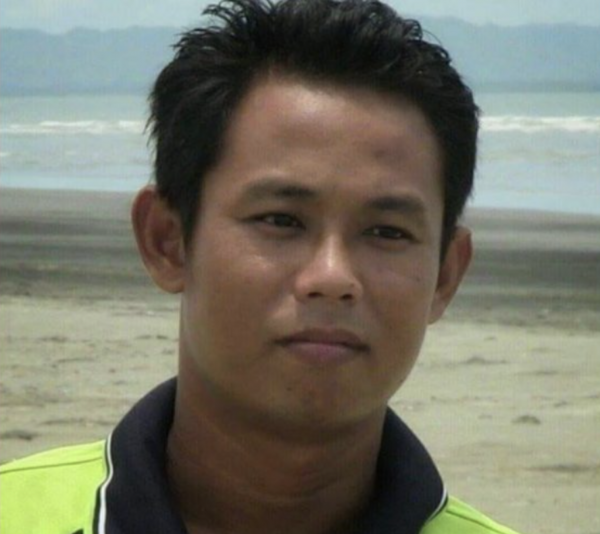On July 9, Uzbekistan, Central Asia’s most populous nation, re-elected its president, in an atmosphere which local independent journalists describe as extremely constraining for their profession, limiting options for real political pluralism in Uzbekistan.
President Shavkat Mirziyoyev was officially declared the winner of the race, receiving 87 percent of the vote, in an election described by international observers as “lacking genuine competition”.
While there were four candidates in total, all nominated by their respective political parties, observers agreed that none of the challengers seriously aimed to take on Mirziyoyev.
Unregistered parties were excluded from the vote, as they have been in all elections since Uzbekistan declared independence in 1991. In a previous election in 2021, the banned Erk party attempted to register, nominating a popular singer, Jahongir Otajonov, as its candidate. Otajonov quit the race after being attacked. In 2021, another unregistered party, the Truth and Development party, was harassed as it tried to organize, too, and ultimately failed to obtain registration.
Opportunities for political transition further narrowed following a constitutional referendum in April this year. The referendum included changes that enable Mirziyoyev’s re-election until 2037 – mirroring a 2020 referendum in Russia whose passage officially approved the possibility of Vladimir Putin’s re-election until 2036.
In the run-up to the referendum, independent journalists were harassed and warned against publishing critical articles, or even informing the public that the April referendum would include such changes, independent Uzbek journalists told IPI. Anora Sodiqova, editor-in-chief of online news site Rost24.uz, told IPI that she received anonymous blackmail threats in March ahead of the referendum. “Other journalists I am in touch with were summoned to the police and threatened with prosecution”, she said.
She explained that journalists received calls telling them what they can and cannot publish. “People call and ask to delete an article. Mainly this is about corruption, especially when related to the president’s family, government ministers, the head of the security services. Also, news related to the war in Ukraine (is taboo), we cannot publish news about people dying, and about the fact that Russia is invading this country.”
A ‘new Uzbekistan’?
Elected in 2016 following the death of long-time president Islam Karimov, Mirziyoyev declared his political agenda as building a “New Uzbekistan”. However, reforms did not go nearly as far as many had hoped.
“Initially, we thought we would be able to influence something in the state”, said Daryna Solod, editor-in-chief at Hook.Report, an independent online media outlet based in Tashkent.
“But the longer Mirziyoyev was in power, the more his surroundings and apparatus started resembling that of Karimov in its early years. We understood that all his reforms were just appearances, and that thinking that anything beyond slight economic liberalization was possible was simply naïve.”
Critical reporting is the subject of a cat-and-mouse game with the Uzbek authorities, including the powerful State Security Service (SSS). “Journalists know how authorities will react”, Solod said. “For example, they publish a critical article and, following pressure, they take it down after half an hour, it appears again in cache and goes around the whole internet.”
The scenario Solod described occurred again several weeks ago on the anniversary of mass protests in Karakalpakstan, an autonomous region in the west of the country. According to official statistics, 21 people were killed and hundreds of others wounded in the 2022 unrest. In the ensuing crackdown, activist and journalist Dauletmurat Tajimuratov was sentenced to 16 years in prison, while journalist Lollagul Kallykhanova, the founder of the Makan.Uz website, received an eight-year prison sentence. In total, no fewer than 18 people were sentenced in what international human rights groups denounced as politically motivated trials.
On the anniversary of the unrest, leading Uzbek online media Gazeta.uz published an article documenting the refusal by authorities to provide a full list of those killed, let alone conduct a thorough investigation into the events. Within hours, the article was taken offline following informal pressure by authorities. However, other websites republished a cached version of the page.
Cases like this show that “independent media just about exist in Uzbekistan”, said Joanna Lillis, a freelance journalist who has reported extensively on Central Asia for outlets such as The Economist, Guardian, and Politico.
“They feel very pressured over what they can report on”, Lillis added. “This pressure is carried out by security service officials, including through phone calls (in which journalists) are asked to remove articles. Some journalists need to submit articles for approval by security services, others practice self-censorship, which has become stronger over the past few months.” All journalists across the Uzbek media spectrum function within these limitations, Lillis explained.
Shadows of the Karimov era remain, seven years on
Issues faced by Uzbek media stem back to the era of Islam Karimov, the country’s president until 2016. Under Karimov, media outlets published “the same four-five stories a day” dictated by the government, Daryna Solod recalled, adding that at the time, independent journalists such as herself “saw no point” in openly working on anything besides entertainment-related content.
While developments were initially promising, with all previously imprisoned journalists having been set free after the change in power, authorities have started slipping back into their old ways. Seven years after the president’s passing, much of the state apparatus of surveillance has stayed in place, said Steve Swerdlow, a human rights lawyer and former head of Human Rights Watch in Uzbekistan, now working as associate professor of the practice of human rights at the University of Southern California.
In 2018, “the government really crossed the Rubicon when, after a two-year break, it imprisoned blogger Otabek Sattoriy, and Uzbekistan again became a country with an imprisoned journalist”, Swerdlow told IPI, adding that punitive psychiatry (i.e., internment in a psychiatric hospital) had also been reintroduced, targeting bloggers who criticize the president.
“The SSS typically assigns a curator or supervisor to every media outlet in the country, who is tasked with monitoring their activity”, Swerdlow explained. “They are monitored very closely, and the security services can very quickly activate a whole host of criminal charges against journalists they do not like.”
These negative tendencies are confirmed by Daryna Solod: “This is not like in Karimov times, when we had summons and (journalists) handcuffed…(Nowadays), meetings are proposed on ‘neutral territories’, such as restaurants. In one such case, one of my journalists was threatened with prosecution on grounds of uprooting constitutional order. They told my journalist that Hook.Report can write on any topic it wants, except Mirziyoyev and his family, and that if we do, they will publish a recording accusing us of state treason.”
Repression against journalists and other critical voices has also been made easier through new repressive regulations, including prison terms for insulting the head of state, with stricter penalties if this is done in print, in the media or online.
“There is no denying that we are not back in Karimov times yet, although many journalists say that this is the way this is going”, Lillis commented. “There are still outlets doing punchy work, but there are red lines, taboo topics which media outlets are not allowed to cross, and criticizing President Mirziyoyev is the top one.”
She added: “Mirziyoyev regularly repeats his commitment to freedom of the press, but actions speak louder than words. And this is what foreign journalists will be writing about, but Uzbek ones cannot.”
Hidden censorship and informal pressure
Solod explained that censorship in the country is often “hidden”, saying, “It’s not that we cannot write critical articles about Mirziyoyev, it’s that we do not have the possibility to write these according to standards accepted by serious news organizations. Just to start with, there are no open databases to rely on.”
Prior to the constitutional referendum in April, independent journalists “both understood that we shouldn’t be writing about this (topic), but people also called to tell us this,” Sodiqova said.
Moreover, Uzbekistan works according to what Solod calls the “six-handshake rule”, according to which the members of Uzbekistan’s narrow elite know one another, benefit from being part of the system, and have no interest in sharing sensitive information with journalists.
Despite this, independent media are greatly popular in Uzbekistan, according to Solod, with “civil servants massively reading media outlets such as Sarpa, Hook.Report or Anhora.”
“Things get through, with Facebook and Telegram remaining very lively”, Swerdlow confirmed, adding that “even Uzbek officials use proxy servers to access the Uzbek service of Radio Free Europe”.
Despite this, “the president has also not given a single press conference since he came to power in 2016, or a single sit-down interview”, Swerdlow said. “And that says it all.”



